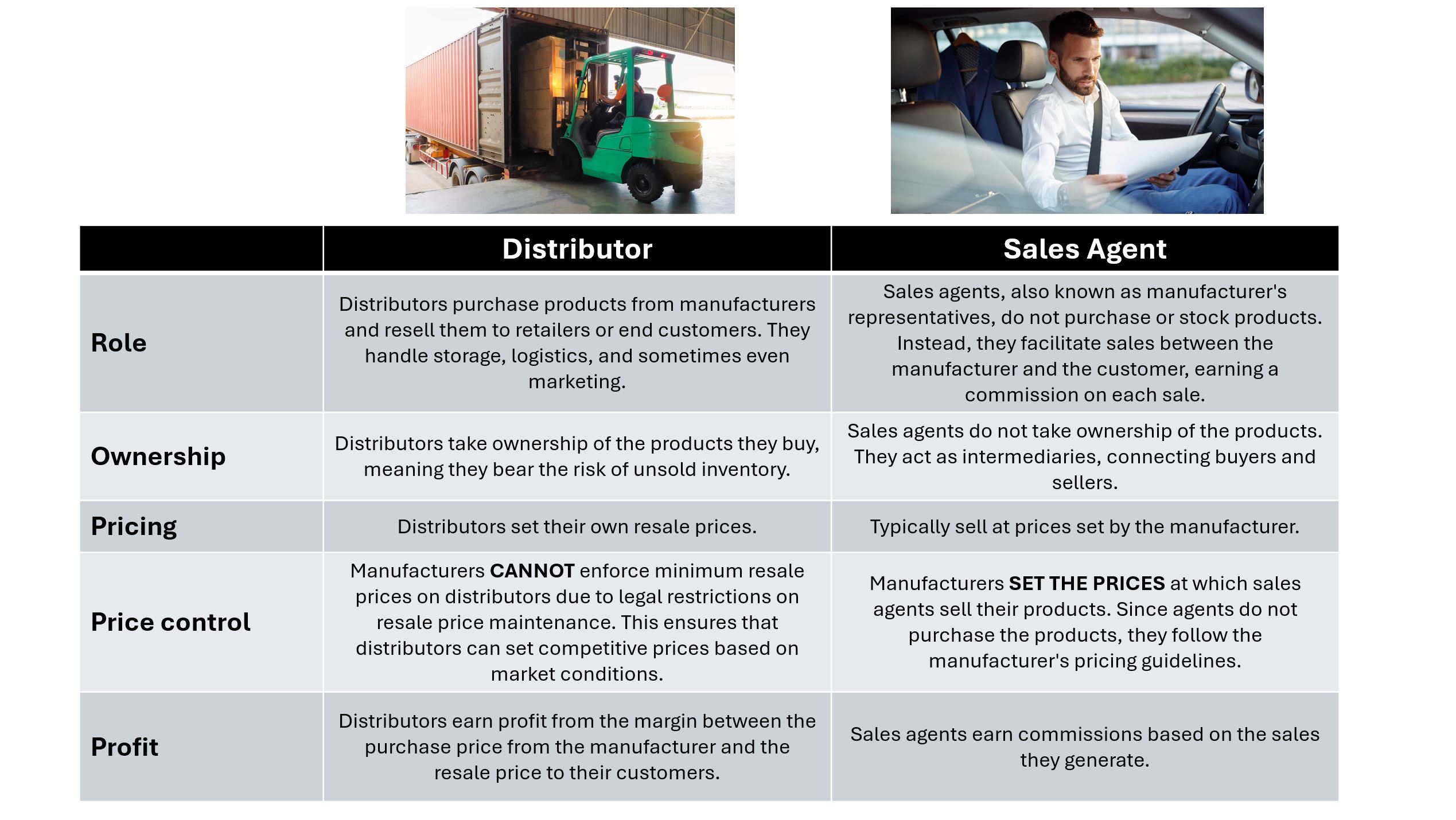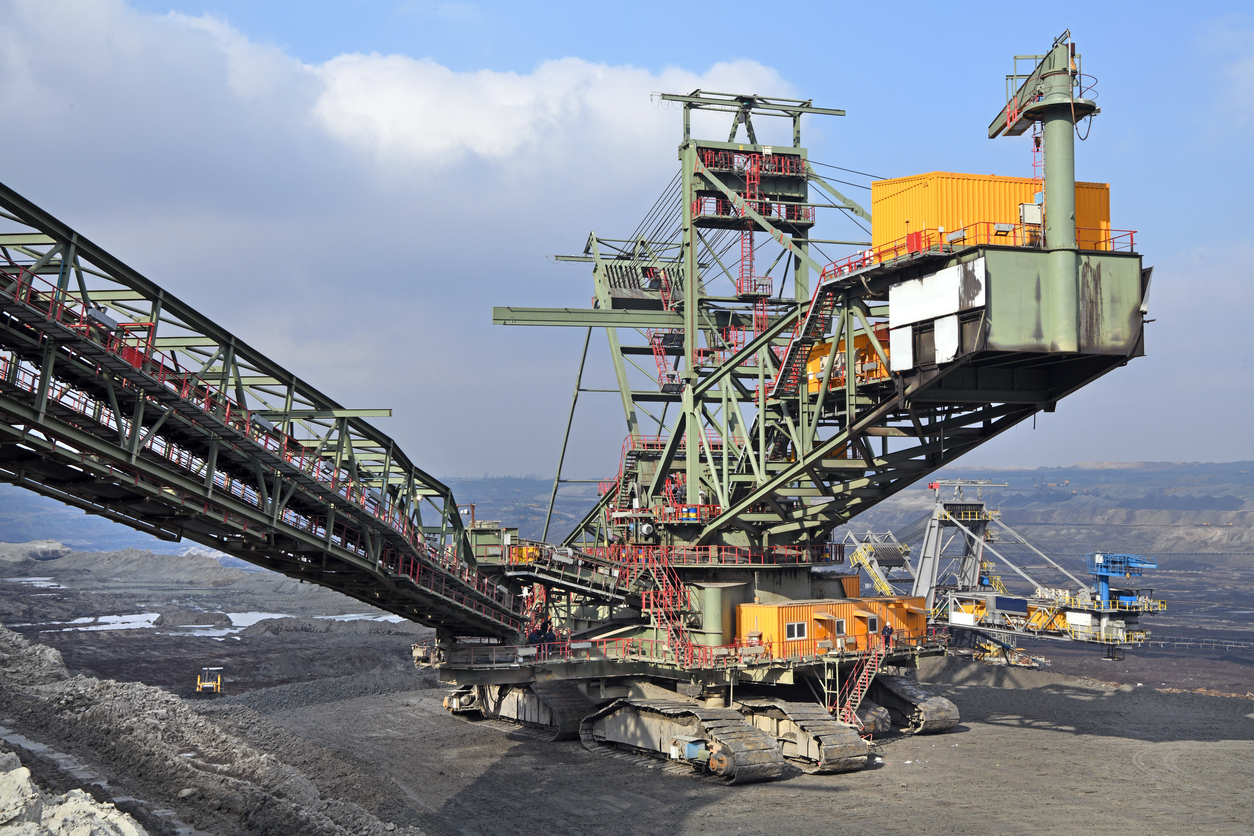09 May 2023
The role of an agent in distribution: A unique indirect sales channel
There are many ways for sellers to find customers and deliver their products and services. One such method is through the utilization of agents. Also known as "sales agents" or "manufacturer's representative."
In distribution, an agent can be defined as an independent entity or individual acting on behalf of a manufacturer or supplier to promote, sell, and distribute their products or services to end-users. Acting as a bridge between the producer and the market, agents serve as intermediaries, leveraging their industry expertise, networks, and market knowledge to facilitate sales and build relationships between a supplier and a customer.
Key characteristics of agents:
Like a distributor an agent is independent (runs their own business).
At first glance, an agent and a distributor appear to be the same thing, but the distinction is clear.
The main difference between a DISTRIBUTOR (wholesale or retail distributors) and an AGENT is....
Agents do not purchase and stock the product. Instead, they find buyers, facilitate the sale, and receive a commission for closing the transaction.
In this way, agents behave similarly to a company employed sales representative but run their own business. Generally, the agent is paid by the manufacturer (or import distributor) for their service not by the customer.
Agents are only paid on the successful completion of a deal; they (usually) receive no other payments and (usually) fund their sales activities at their own expense.

...which sounds kind of grim but they are typically paid hefty commissions which (all going well) more than compensates them for their efforts and funds their activities between deals.
Of course, in business the specifics of each agency agreement are customized to the specific needs of both parties, hence the use of the qualifier "usually" above. In this article we describe the sales agent concept using the broad principle of what sales agency means.
Agents have the following characteristics:
-
Independence: Unlike employees, agents typically operate autonomously, maintaining their own business operations while representing the interests of the manufacturer or supplier. This independence allows agents to adapt to market dynamics swiftly and make decisions in the best interest of both parties. It also means they don't "punch the clock" - an agent can choose to work everyday or very few. Nobody is watching how they spend their time but their continued tenure as an official agent is judged purely on the results they produce.
-
Expertise and Market Knowledge: Agents possess an understanding of the industry they operate in, including knowledge of the products and technologies used in their industry, market trends, consumer preferences, potential customers, and knowledge of competitors. The agent's expertise and networks would be local to their sales territory. This specialized knowledge and reach is what the principal (the manufacturer or originator of the product or service) would be looking for when appointing a sales agent. The typical technical product agent in the mining industry (for example) would have an extensive background working in the mining industry and would already have deep technical understanding of the machinery, processes, and applications for the products being made by the manufacturer.
-
Extensive Networks: Agents usually have an established network of contacts and relationships within their respective industries. Leveraging these connections, they can efficiently identify sales opportunities thus expanding the principal's market reach. Such networks would enable them to spot potential opportunities early and leverage other relationships to get closer to the decision makers. For the supplier located at a distance (interstate or overseas) this enables the agent to position the company as a potential supplier for opportunities that ordinarily they would never hear about it.
-
Localized knowledge and networks: The whole point of sales agents is to provide market reach into localities some distance from the principal business. The ideal sales agent is a person or business that is well established in the sales territory with extensive networks and local knowledge as described above. This delivers to the principal business instant local knowledge and contacts. As an example a machinery manufacturer in Germany seeking to develop a market in Australia would find an Australian based agent who could promote their product to potential Australian buyers.
-
Authority to act: Generally, an agent is authorized to act on behalf of the company it represents. Meaning, that if a sales agent closes a contract with a customer then the contract for sale is between the customer and the company being represented. If the company fails some part of the contract then the customer must seek relief from the company not the agent. This is the true meaning of "agency" - and some will refer to such people or entities as their "authorized representative." However, as mentioned previously every agency agreement is customized; many companies will authorize the agent to act to set limits of exposure. Any deal outside those limits is either handled direct by a company employee (without cutting the agent's commission) or the agent must first obtain sign-off before proceeding with the deal.
The differences between DISTRIBUTORS and SALES AGENTS

While both distributors and sales agents are part of indirect distribution strategies, the key difference lies in ownership and pricing control.
Distributors have more autonomy in setting prices, whereas manufacturers can exert more control over the prices set by sales agents.
Different Profit Margins
The sales agent's commission is generally in the range of a few percent. Whereas the distributor's profit margin is generally an order of magnitude greater (more like 30%). For very high capital cost products (for example million dollar mining equipment) in neither makes sense for distributor's to buy stock and there isn't room for large margins.
Different legal relationships
The distributor is legally liable for the sales contract and the product performance (although usually backed by the manufacturer). The customer seeking damages would sue the distributor.
However, the sales agent is authorized to act on behalf of the manufacturer. The final contract is between the buyer and the manufacturer. Legal action for non-performance bypasses the sales agent.
Typical profile of an agent

There are generally two types of sales agents...
-
Individuals: Many sales agents operate as "one-man-bands." Individuals that work alone (sometimes with one or two support staff). Typically, individuals that have had a long career in an industry sector and have accumulated expert industry knowledge and developed extensive industry contacts in end-user segments. They leverage their knowledge and networks to identify opportunities to "arrange marriages" between the suppliers they represent and organizations that need specialized products and services.
-
Distribution agencies: Many agents represent multiple companies and supply a range of products and services. Typically these businesses run mixed businesses operating as both traditional distributors (buying and stocking products) and operate as agencies representing manufacturers and suppliers on a commission only basis. In Australia, typical agencies supplying rural communities (farming operations) are situated in regional centres (country towns) with a shop front and stock a wide range of small equipment and supplies but are also the local agents for large farm equipment such as tractors, seeders, ploughs and harvesters. They may also provide spare parts and mechanical servicing.
Examples of products and services typically sold via agents.

Generally large capital value items and/or supply deals where the high-value of each item precludes the agent first purchasing and stocking the item. For example:
-
Real estate: We all know the term "real estate agent." This is a classic example of what is meant by an agent. The real estate agent doesn't buy a property in order to have the right to sell it at a profit. Instead the agent is appointed by the property owner and provided the exclusive right to act on behalf of the property owner (the vendor) to market and sell that property. The real estate agent is paid a commission on the sale.
-
Combine harvesters: Combine harvesters typically cost between AUD$100,000 and AUD$500,000. Such high-capital cost precludes holding stock. Generally, combine harvesters are sold by sales agents who place the order to the manufacturer. The manufacturer only starts building the machine once an order has been placed.
-
Large mining equipment: Similarly with mining equipment (examples: ball mills, crushing machines, conveyor belts, excavators, dump-trucks etc.). Such equipment can be sold through both direct selling but also sales agents.
-
Large supply contracts: One-off supply or recurrent supply contracts of high-value specialized products (for example refractory bricks) are often facilitated by sales agents. Sales agents have a detailed knowledge of the types of end-users of such products and can identify sales opportunities.
-
Travel agents: The travel agent has extensive knowledge of overseas destinations, airline routes, operators and ticketing, accommodation options etc. They act as booking agents. Clearly they do not buy travel inventory in advance but take a commission on bookings. More than just booking agents they use their knowledge to advise customers on the best options and help them to tailor a travel plan that suits their need and budget. The travel industry is a complex interwoven mesh of operators (for example airlines, hotels, and on-the-ground transport and attractions), Wholesalers, DMCs, and Tour Operators (these are companies that package operator's inventory into pre-planned/pre-arranged "brochured" packages and market them through travel agents) and agents who market and sell these products and operators' inventory to travelers. Travel agents can be independents, chains, or franchises. Some operate purely as online businesses acting as booking portals for example Wotif, Webjet, and Trivago. The role of the Travel Agent has been somewhat usurped by the internet (people booking themselves known in the trade as "dynamic packaging"), in response travel agents are now differentiating based on personalized service, problem solving (particularly while the traveler is on-tour), and creating high-end bespoke travel experiences for people who are prepared to pay. Further the Travel Agents' extensive knowledge and experience of real-world travel can help the inexperienced traveler avoid costly mistakes through unrealistic connections and schedules, dodgy hotels, tours, attractions and places to avoid, optimizing seasonal variations, travel insurance, VISA requirements, inoculation advice, and general tricks and tips.
Exclusive vs non-exclusive sales agents
In an ideal world a company would seek to appoint an agent in to a geographic location whose sole focus was seeking and closing sales representing only their products and services.
This is only possible if the projected market size in that territory justified full time activity. A sales agent that couldn't make an above average income from such an arrangement would soon move on to greener pastures.
Hence, some companies are happy to appoint an agent who represents a number of non-competing companies and/or has a mixed business acting as both a distributor (buying and re-selling products) and an acting as the authorized agent for one or more manufacturers. This is the typical arrangement in rural communities.
Agent vs. Other indirect distribution channels:

While agents share similarities with other forms of indirect distribution, such as wholesalers or retailers, several key differentiators set them apart:
-
Reduced Financial Risk: Unlike distributors who purchase goods for resale, agents do not take ownership of the products. Instead, they earn a commission or fee based on sales generated. This structure reduces financial risk for both the manufacturer and the agent, as the latter is not burdened with inventory costs or potential unsold goods.
-
Cost-Effectiveness: Engaging an agent can often be a cost-effective distribution strategy for manufacturers. Rather than establishing and maintaining their own distribution infrastructure, manufacturers can leverage the agent's existing resources, networks, and expertise, reducing operational expenses.
